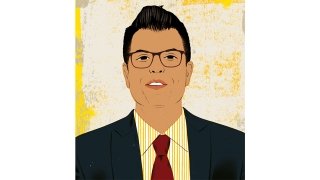On Tuesday, May 31, at 4:30 P.M., San Diego’s Petco Park, home of the San Diego Padres, will host a different kind of gathering: the investiture of Carlos O. Cortez PhD ’06 as chancellor of the San Diego Community College District (SDCCD). “Most investitures are closed-door, power broker events,” notes Cortez, a graduate of USC Rossier’s program in education policy and administration. “This one is a popcorn and hot dog sort of affair, free and open to the public.” In recognition of Cortez’s careerlong commitment to social justice, the celebration is billed as “a home run for diversity and inclusion.”
Cortez, nationally recognized as an educational leader, is the first chancellor of a California community college to identify as both queer and binary.
Finding enduring inspiration in the work of Alice Walker, Cortez invited the acclaimed writer and activist to be keynote speaker for his investiture celebration. He first read Walker’s novel The Color Purple as a teenager. “It opened my eyes to omissions of historical truth—such as the suppressed history of lynching in America—that I encountered in high school and later as a history major in college,” he says. Walker’s work reflects the exploration that motivated Cortez throughout his education and career. His degrees—a bachelor’s from Georgetown University, a master’s from New York University, and a PhD in education policy and administration from USC Rossier—focus on African American feminist political history.
At USC Rossier, his doctoral dissertation examined how African American female educators instigated political reform in the Los Angeles area at the height of the Black Power Movement. He interviewed notable educator-activists, such as U.S. Rep. Diane Watson, activist-academic Angela Davis, Los Angeles Unified School District board member Marguerite LaMotte, and many other progressive change agents who began their careers as teachers. The research deepened his understanding of how educators can shape policy. “I came into the field because I wanted to change institutions and the policies that ultimately have consequences on the most vulnerable members of society,” he says.
Throughout his career, Cortez chose to work primarily with ethnically diverse underserved student populations from low-income communities. He began his career in the Teach for America corps, served as director of education extension at UCLA, and was acting vice president of instruction at Berkeley City College. Starting in 2015, Cortez was president of the San Diego College of Continuing Education. Since becoming chancellor and chief executive officer of the SDCCD in July 2021, he now oversees 100,000 students on 10 campuses: San Diego City, Mesa and Miramar colleges, and the San Diego College of Continuing Education’s seven sites.
Cortez takes the lead on all operations in a district that is the largest provider of workforce training and education in the region, with a $780 million annual budget. Projects now underway include four-year baccalaureate programs offering leading-edge professional training, and expanding equity and access in a district where a growing number of students contend with hunger and housing insecurities.
In the spirit of the educator-activists of his USC Rossier thesis, Cortez partners with legislators to write and support bills that promote the welfare of the SDCCD and its stakeholders. AB 1719, introduced in the California State Assembly in January, expands on provisions of previous legislation to allow community college and K–12 school districts to construct affordable housing for students, faculty, staff, and current and former foster youth on their property.
At his investiture, the theme of Cortez’s speech will be the role of community colleges in combating poverty. “I believe that it’s better for marginalized and vulnerable populations to link arms rather than be positioned against one another,” he says. “We need to embrace the rich complexity of human beings, many of whom are multiracial and multiethnic and have new conceptions of gender and sexuality, not binary or simplistic terms of gender and race. This is the opportunity that lies ahead.”




